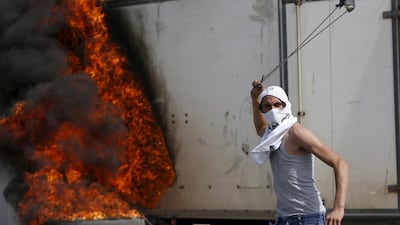JERUSALEM // Israel tightened its grip on Palestinian communities on Sunday after several cities banned Arab labourers from working in schools and security forces started barricading a Palestinian neighbourhood in occupied East Jerusalem.
The moves are part of an Israeli security crackdown after violence in recent weeks has killed 42 Palestinians and seven Israelis.
Last night a Palestinian was killed and another injured in the southern Israeli city of Beersheba after they allegedly opened fire in the city’s central bus station injuring at least five Israelis, Israeli police said.
In East Jerusalem, the five metre-high concrete slabs were lowered into place between the Palestinian neighbourhood of Jebel Mukaber and the Jewish area of Armon Hanatziv.
Authorities have blocked roads and placed checkpoints at the entrance to Jabal Mukaber and other Palestinian neighbourhoods. Other security measures include ID checks and requiring some Palestinian residents to lift their shirts and roll up pant legs as they exit their neighbourhoods to prove they are not carrying knives. Soldiers have been deployed in Jerusalem and cities across Israel.
Palestinians said the roadblocks are collective punishment and ineffective in deterring attackers since those with bad intentions would try to reach Jewish neighbourhoods through dirt roads anyway.
Israeli police spokeswoman Luba Samri said the barrier was meant to protect the Jewish neighbourhood from rocks and firebombs. Israel claims several of the Palestinians who have carried out attacks against Israelis have come from Jebel Mukaber.
Meanwhile, at least four Israeli cities, including Tel Aviv, have temporarily banned Palestinian labourers from working in their schools.
A party representing Israel’s Palestinian minority called the municipalities’ edicts “racist”.
“Under cover of anxiety, dangerous measures of racist exclusion are being advanced,” said Dov Khenin, a legislator from the Joint Arab List, the largest Palestinian party in Israel.
Israel’s Interior Ministry, which oversees the municipalities, said it appealed to “all mayors to continue to act with respect and equality towards all their workers, irrespective of religion, ethnicity or gender”. It did not ask them to repeal the restrictions.
Citing security concerns, Tel Aviv and the nearby cities of Rehovot and Hod Hasharon avoided using the word “Arab” in announcing on their websites and emails to residents that maintenance workers and cleaners – many of whom are Palestinians – would not be allowed into schools.
Another city, Modiin-Maccabim-Reut, midway between Tel Aviv and Jerusalem, said “minority members” — a term Jews in Israel often use for Palestinian citizens who make up 20 per cent of the population of eight million — would be banned from working in its schools.
Spokesmen for Tel Aviv and Rehovot said Jews as well as Palestinians would be covered by the temporary ban.
But Doron Milberg, director-general of the municipality of Rehovot acknowledged that Palestinians would be most affected by the decision because “those who work in construction ... are the minorities”.
The recent violence has in part been triggered by Palestinians’ anger over what they see as increased Jewish encroachment on Jerusalem’s Al Aqsa mosque compound.
“We are preserving the status quo, we will continue to do so,” Prime Minister Benjamin Netanyahu said on Sunday to his cabinet, referring to the site that is also revered by Jews as the location of two destroyed biblical temples.
Mr Netanyahu is to meet US Secretary of State John Kerry in Germany in the coming week as part of an effort by Washington to restore calm. Mr Kerry also plans to hold talks with Palestinian President Mahmoud Abbas.
The Palestinian dead have included protesters shot by Israeli forces during demonstrationsand alleged knife attackers.
Two of the alleged assailants in attacks on Israelis over the past two weeks were Palestinian with Israeli citizenship. The others were Palestinians from occupied East Jerusalem and the West Bank.
On Saturday, Israel shot dead four Palestinians they accused of trying to attack Israelis.
*Agencies

